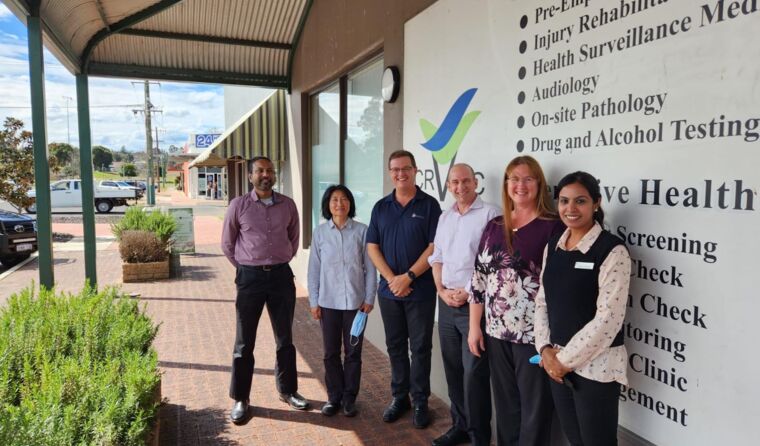News
WA tour to help tackle rural crisis
College leadership met with rural members as part of advocacy efforts to address the state’s general practice ‘workforce crisis’.
 (L–R) Practice manager Janet Innes, Dr Karin Jodlowski-Tan, Dr Ramya Raman and Dr Michael Clements outside Earl Street Surgery, Narrogin. (Image: Supplied)
(L–R) Practice manager Janet Innes, Dr Karin Jodlowski-Tan, Dr Ramya Raman and Dr Michael Clements outside Earl Street Surgery, Narrogin. (Image: Supplied)
Over the past week, RACGP leaders embarked on a road trip across southern Western Australia to collaborate with local healthcare providers in an effort to further address workforce issues.
RACGP Rural Chair Dr Michael Clements, WA Chair Dr Ramya Raman, and Rural Council Provost and National Rural Clinical Lead, Dr Karin Jodlowski-Tan, met with local GPs and other key health stakeholders in Busselton, Bunbury, Collie, Katanning, and Narrogin.
The tour concluded in Perth, where the college representatives met with WA’s health workforce agency Rural Health West Workforce Solutions and the WA Country Health Service.
No exception to the nationwide, ongoing pressures buckling the healthcare system, WA’s hospitals are overrun and general practice urgently requires stronger investment. A key advocacy priority of the college is to push for improved government investment in comprehensive and coordinated general practice care.
Dr Raman is disappointed with her state’s leadership demonstrating a lack of understanding of the pressures facing general practice, instead pointing the finger at GPs for WA’s overburdened hospital system.
‘This is a huge problem in WA, and across Australia where we are increasingly seeing overcrowded emergency departments, and dangerously long wait times for patients,’ she said.
‘GPs are seeing more patients than ever … [and] ongoing care, preventive care and early intervention is the work of GPs – it saves lives, as well as being much more cost effective.’
Dr Raman warns that with general practice being undervalued and contributing to the GP workforce shortage, this is resulting in recruitment and retention issues, GP burnout and rising patients costs.
‘Medicare patient rebates have not kept pace with inflation and don’t come near covering the cost of delivering high-quality care in communities across Australia,’ she said.
‘[This] is particularly severe in rural and remote WA [and] is really concerning because the data shows that GP clinics are far better distributed across Australia than other specialists and healthcare professionals, including allied health, pharmacists and nurse practitioners.
‘Rural communities really rely on their local GP for the majority of their health and wellbeing needs.’
Dr Clements, who continues to be vocal about improving GP recruitment in rural communities, says that the college is ‘uniquely placed’ to address workforce shortages and improve access to care for communities through engaging face-to-face with members and listening to their concerns.
‘We have been listening to our members, and we know years of underfunding and neglect has put general practice in crisis. Medicare patient rebates are far too low and forcing many practices to abandon bulk billing to keep their doors open,’ he said.
‘Nobody understands the issues better than the GPs working hard in rural communities on the ground in WA.
‘Rural Australia in particular has been hard hit, with clinics at risk of closures and an overreliance on fly-in fly-out GPs.
‘All communities need access to continuous, sustainable GP care. And we are calling on governments to implement the reforms needed to make this happen – governments need to act to put rural communities first.’
 GPs outside Collie River Valley Medical Centre. (Image: Supplied)
GPs outside Collie River Valley Medical Centre. (Image: Supplied)
The recent signing of the contract with the Federal Department of Health and Aged Care to deliver the Australian General Practice Training (AGPT) program from 1 February 2023 is the latest step towards what has been described as a ‘transformative’ transition to profession-led training and an opportunity to reform general practice training.
Dr Clements says it will also help to improve GP distribution across Australia.
‘Continued support for college-led training from all sides of government is essential, because it will make a real difference for the future of general practice training, and communities across Australia,’ he said.
‘The college has developed a model for training which is locally tailored and delivered, and focuses on areas where there are workforce shortages.
‘We are also calling on the Federal Government to implement reforms in the short term to improve access to care to those most vulnerable, including rural Australians.’
Additional Workforce Incentive Programs and funding for GP supervisors to support GPs in training in rural communities are also on the college’s agenda.
‘With the right support, we know GPs who train in rural communities are more likely to choose to stay living and working there, and so the communities win,’ Dr Clements said.
Dr Raman agrees that addressing the shortfalls in general practice applies to not only her state, but communities nationwide.
‘We need to re-think health funding in Australia, and boost investment in GP–patient services, including Medicare-subsidised patient services,’ she said.
‘Because everyone needs access to high-quality ongoing and preventive care, no matter their postcode, and practices must be sustainable to keep their doors open and attract new GPs to meet their communities’ needs.’
Log in below to join the conversation.
RACGP Rural rural general practice Western Australia workforce shortages
newsGP weekly poll
Would it affect your prescribing if proven obesity management medications were added to the PBS?